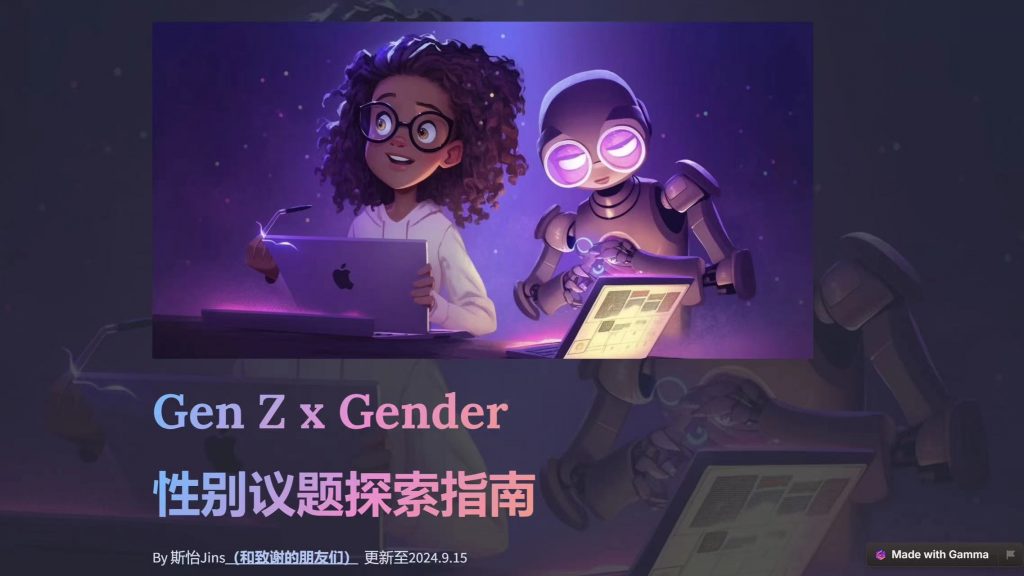The unmarried rate for women aged 25-29 in China has increased by 16% in last decade. Is this how women in China are starting to express feminism?

Media and Gender is a quite niche major, yet Liu Siyi, a post-00s girl from China, has embraced it with enthusiasm.
“Actually, I didn’t know about this major when I first chose my field of study,” says Siyi. “But as I learned about media studies, I found many research directions were too broad or not my cup of tea. Then, I discovered that the advisor for the Media and Gender major was a very caring female professor, and the major itself piqued my interest. So, I went for it.”
As a student of Media and Gender with a background in digital media and business, Siyi has her own understanding of feminism.
“I think feminism has a broad definition, and I can only share my personal, limited perspective,” says Siyi. “Currently, I resonate with Chizuko Ueno’s definition of feminism, which is about a society that respects the vulnerable.”
Siyi says that she doesn’t strictly follow the logic that feminism is all about women becoming strong; instead, she leans more towards the view that feminism is about respecting the weak. “Moreover, I believe that feminism is fundamentally about pursuing gender equality,” says Siyi.
In recent years, there has been a notable increase in the number of unmarried young women in China. Specifically, the unmarried rate among women aged 25 to 29 has risen by 16% over the past decade. Many attribute this trend to the growing awareness of feminism. However, Siyi holds a unique perspective on this matter.
Siyi believes that the spread of feminism has certainly influenced the trend of late marriage, but it’s not the sole cause. She says, “Feminism probably does more to help women become aware of the issues present in society. For instance, the economic costs of marriage and childbirth are increasingly high, the job market is fiercely competitive, and government subsidies in areas like housing, childbirth, and education are far from adequate. Additionally, the discrimination against women in the workplace and issues with maternity leave are also in dire need of improvement.”

Siyi likens feminism to a window that allows women to clearly see the pressures society imposes on them.
“So, I think the awareness of feminism might make you more sensitive to the unfavorable impact of current social policies and the environment on marriage. I personally believe that this is a combination of various factors. The role of feminism here might be more about helping you realize what issues still need to be addressed in today’s society,” says Siyi.
Siyi uses her sister as an example, “For instance, my sister back home hasn’t gotten married yet. But has she read any books by Chizuko Ueno? Not at all. She doesn’t even know what feminism is. Yet, she senses that if she gets married, under the weight of traditional concepts and societal pressure, her life might not be very good. I think she has a very simple feminist thought.”
Siyi says that she believes the core spirit of feminism is resistance, but once resistance achieves gender equality, people would no longer reject marriage. “If there really is a marriage with gender equality in the world, then feminism would also be delighted to see it. Just as feminism is not equivalent to non-marriage doctrine,” says Siyi.
Continuing her thought, Siyi points out the driving force behind the social pressure on women in China. “This pressure is symptomatic of the rising expectations Chinese society places on women,” she says.
Siyi explains it this way: In the early days, Chinese society had more traditional expectations for women, which were to become ‘virtuous wives and good mothers.’ Later, with the establishment of New China, women were encouraged to actively participate in the workforce, emphasizing their role as part of the working class and urging them to contribute to social production. However, over time, especially after the reform and opening up, societal expectations seemed to regress, once again emphasizing that women should focus more on domestic roles.
“In contemporary times, these expectations have become more complex and dualistic,” says Siyi. “Society wants women to be successful and financially independent in the workplace, while also expecting them to take on traditional nurturing responsibilities at home. This double standard actually reflects an attitude driven by interests: when society needs contributions from women, it encourages them to become stronger; but when that need weakens, or when men already dominate the power structure, society expects women to return to traditional gender roles. It can also be said that societal expectations of women are largely centered around patriarchy, aimed at maintaining male dominance and interests.”
In the current social context, Siyi believes that China still has a long way to go in achieving gender equality.
“The most obvious issue is marriage,” Siyi says. “Marriage in traditional Chinese concepts is actually very restrictive for women. For example, women take on the majority of domestic labor, but this invisible contribution often goes unrecognized. Additionally, the employment discrimination women face because of marriage is also very serious. This is a significant reason why women today are hesitant about marriage and childbirth.”
After completing her media and gender studies major in China, Siyi has come to Europe for academic visiting, studying business this year. This unique cultural and professional perspective has given her more thoughts on feminism and has deepened her understanding of the complexity of gender equality in the context of Chinese society and its differences from the West.
“I think Chinese feminism is very different from Western feminism. The social foundations are different to begin with. The West is essentially capitalist, and the gender issues we face in a socialist country are not quite the same. For example, the rural class still makes up a large part of our country, and rural women face more severe gender discrimination. Additionally, there are still issues with educational stratification in East Asian societies, and the education level of women also affects the development of feminism,” says Siyi. “Like the neoliberalism we talk about, its emphasis on individual choice works within capitalism, but in China, we face not only gender issues but also many other issues such as family, class, traditional culture, religion, and so on. I think this is also why Ueno Chizuko is quite well-known in China, because she does have a more East Asian perspective on feminism.”
Siyi says that what she feels most deeply during her study abroad is that young people, especially young women abroad are very keen on discussing politics and public issues. In contrast, in China, the participation of youth and women in politics, as well as the popularity of political education, is not very high. “Perhaps the proportion of women in leadership roles in the public sphere is still too low in China, which is also a direction we should strive for,” she says.

Last year, she envisioned a platform to integrate resources and knowledge for those keen on exploring women’s and gender issues. And so, she created a Chinese feminist website with her friends.
“During that time, I was interning at a venture capital firm, but I wasn’t a technical talent, so I had some career anxiety. But my boss, who is a woman, told me that I could use AI and the latest technology to do what I care about most, which inspired me,” says Siyi. “Because feminism is currently still mainly discussed in literature and sociology in China, and it doesn’t have much to do with emerging technologies. I felt like I could try to use some of the most cutting-edge things to create a feminist website. Plus, I haven’t seen any products on the market that I really like or that I really like aesthetically, so I felt that I might need to create something new myself.”
Siyi named the website “GenZ Guide to exploring gender issues,” but she hopes and has achieved an audience that includes not only the younger generation but also groups in their 30s and 40s, serving as a bridge for intergenerational communication.
“I know many people around me think that feminism is a serious and high-bar topic, but I think it is essentially a very vibrant thing. So I want to present it in a lively form, combining the depth of content with the fun of the form, to bring everyone in,” she says.
Siyi said she hopes more and more young girls will realize the importance of feminism and has indeed felt that feminism is becoming more popular among the younger generation in China. She also hopes that feminism will continue to develop in China, building on the historical foundation left by women before them, and thinking about things with new logic.
“For example, we no longer regard marriage as a must-have option in our lives. And I hope that women in China in the future can explore some new logic about marriage, such as childbearing without marriage, living and retiring with friends, and so on,” Siyi said.
